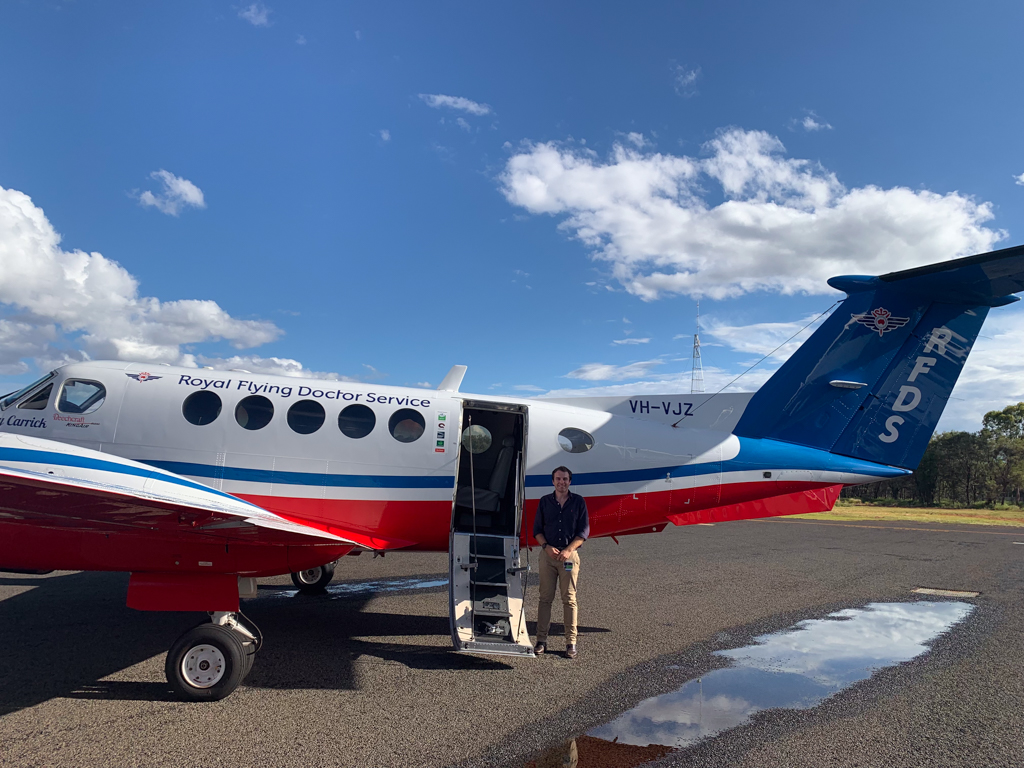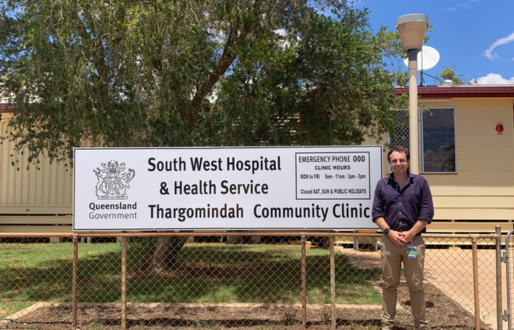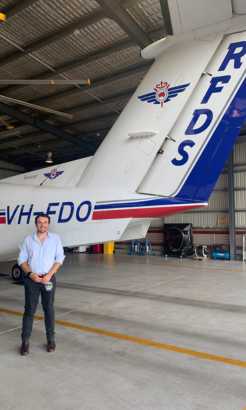Remote placements took a dramatic turn for final-year UNE medical student Jared Lawrence in Queensland earlier this month. But two simultaneous resuscitations and the prospect of a mid-air birth have only strengthened his resolve to head bush when he graduates.
Jared is now on rotation at Gosford Hospital, completing the fifth-year of his formal university training, but recently spent 10 weeks doing a General Practice placement at Charleville and a rural health “choose your own adventure” with Cunnamulla’s only GP. And the medical student got much more than he bargained for.
“I was lucky to spend a few days with the Royal Flying Doctor Service, based in Charleville,” said Jared. “On two separate occasions I helped set up outreach GP clinics in Thargomindah, which only sees a GP every two weeks, and during a day with the emergency retrieval team I was involved in a pre-term birth to a high-risk mother.”

Image: Jared with the Royal Flying Doctor Service.
After touching down at the remote cattle station, Jared and a clinical nurse trained in midwifery found the expectant woman experiencing blood loss and abdominal cramps. Once they stabilised her, she was flown – in labour – to Brisbane for specialist care, eventually giving birth on the tarmac at Brisbane Airport.
“Her husband had to get ringers to clear kangaroos and emus from the airstrip just so we could land,” Jared remembers. “It was quite scary being up in the air with a woman in labour, but fortunately everything went well. It was a real eye-opener.”
It was quite scary being up in the air with a woman in labour, but fortunately everything went well.
At Charleville’s hospital, medical staff were pleased to have Jared’s extra pair of hands when two patients required resuscitation at once in the Emergency Department.

Image: Jared at Thargomindah Community Clinic.
“It all gave me a great experience of remote medicine and the challenges both patients and medical staff face. At Thargomindah, the small population have higher health needs because they lack access to specialists and even prescription medicines, which arrive by post from Charleville. It’s extraordinary for a developed country like ours.”
At Thargomindah, the small population have higher health needs because they lack access to specialists and even prescription medicines.
 Having grown up in Singleton, NSW, Jared already had personal insights into the inequities of healthcare provision and is firmly focussed on working rurally as a GP/obstetrician.
Having grown up in Singleton, NSW, Jared already had personal insights into the inequities of healthcare provision and is firmly focussed on working rurally as a GP/obstetrician.
“During my time in Queensland I saw the opportunities you can have to change a person’s day or life and I am determined to help give rural people the health services they require and deserve,” Jared said. “Going somewhere as remote as Charleville and Cunnamulla opened my eyes to the need for doctors in such areas and showed me I can step up when I need to.
“I look at studying medicine as a privilege and I want to use my skills to uplift rural communities. These are the farmers who supply the meat to our supermarkets, and for them not to receive first-class medicine and healthcare is unacceptable. It’s my dream to give back, and try to equalise the differences between remote and metropolitan healthcare outcomes.”
These are the farmers who supply the meat to our supermarkets, and for them not to receive first-class medicine and healthcare is unacceptable.
After graduating, Jared hopes to complete his two-year internship at either Wagga or Dubbo hospitals. Then he intends to apply to the General Practice Training Program and specialise in more remote medicine with an obstetric advanced skill.
A NSW Rural Doctors scholarship has helped to finance Jared’s studies, but he also works the annual summer grain harvest in NSW or Victoria. The header driving is a source of more than just additional income. “It’s an opportunity for me to spend time with farmers and to understand how they think and what they will need from me when I am treating them. You really need to listen when they speak. It’s setting me up well for my junior doctor years.”


